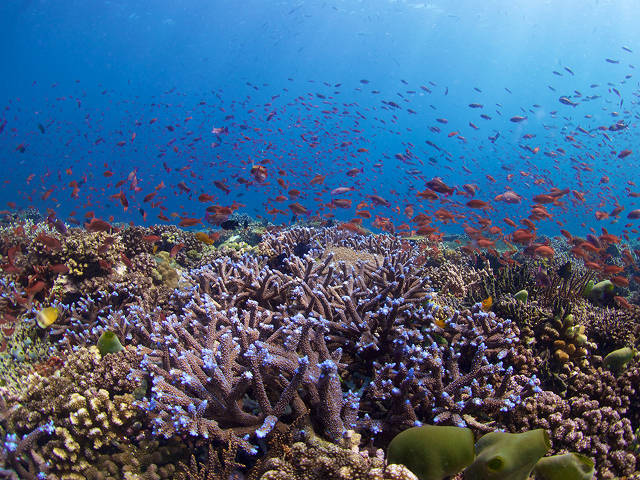
New Delhi: The Australian Marine Conservation Society raised concerns over the coral bleaching on the southern part of the Great Barrier Reef extending to “greater depths” during the current mass bleaching event.
Releasing a new video footage, showing that Bleached corals have been sited down to at least 18 metres depth and some corals are starting to die as they face record marine heatwaves.
Reef coral expert Dr Selina Ward, the former academic director of the University of Queensland’s Heron Island Research Station, said coral bleaching was extensive at all 16 sites and described it as the worst she has seen in her 30 years working on the Reef.
Dr Ward said, “I feel devastated. This bleaching event is the worst I have seen. It’s a severe bleaching event”
“I’ve been working on the Reef since 1992 but this mass coral bleaching event, I’m struggling with. The diversity of species involved has been hard to deal with. Look at bleached areas, many different species are bleached – many of which are pretty resistant to bleaching so it’s not a pleasant one” she added.
“This bleaching event again brings us to the question, what are we doing to stop the Reef from being lost? I can’t help but wonder what it is going to take for the right decisions to be made. We are running out of time. We need to reduce our [greenhouse gas] emissions immediately. We cannot expect to save the Great Barrier Reef and be opening new fossil fuel developments. It’s time to act and there are no more excuses.”
Data from aerial surveys released last week show 75% of the Great Barrier Reef has been bleached during the current mass bleaching event, much of this high to extreme bleaching, said Australian Marine Conservation Society in a statement.
Some regions in the southern reef have experienced unprecedented marine heatwaves, with elevated water temperatures for a record 14.57 degree heating weeks, according to data from the US Government’s world-leading ocean agency, the National Oceanic and Atmospheric Administration (NOAA).
AMCS Great Barrier Reef Campaign Manager Dr Lissa Schindler said, “This new footage shows extensive coral bleaching in southern reefs, but there are images from the central and northern parts that show bleaching is extensive and severe in some of those areas too”
“The Great Barrier Reef is experiencing an unprecedented fifth mass coral bleaching in eight years. This is worse than the past two mass bleaching events – in 2020 and 2022 – and we may discover as bad as the worst bleaching on record in 2016″ Dr. schindler said.
“The Reef has never experienced such extended marine heatwaves before. Some regions in the southern reef experienced elevated water temperatures for an unprecedented 14.5 degree heating weeks, smashing the previous record of 11.8 heating weeks set just four years ago.
“Coral species, which were considered resilient in previous marine heatwaves, are this time bleached. We are already seeing coral dying from this level of heat exposure but expect to see more across multiple coral species.
“Meanwhile the Great Barrier Reef Marine Park Authority chief executive Josh Thomas and the federal government’s special reef envoy, Senator Nita Green, have just been in Paris lobbying UNESCO, which advises on World Heritage ‘Ín Danger’ listings.
“The Great Barrier Reef is a global icon, home to thousands of species and worth $6 billion annually to the economy. If this was a bushfire it would be declared a national disaster but because it is underwater and out of sight, it is not getting the attention it should by our leaders.
“The Great Barrier Reef Marine Park Authority, the custodian of the Reef, must play a greater role in addressing climate change threats to the Reef, starting with urging the Albanese government that urgent emissions cuts are needed. GBRMPA’s recently updated climate statement removed all reference to the need for Australia to increase its climate ambition.
“The Australian Government must lift its emissions reduction targets in line with keeping global warming to 1.5oC – a critical threshold for coral reefs. Australia’s current emissions reduction target of 43% by 2030 is consistent with a 2°C warming pathway, which equates to the loss of 99% of the world’s coral reefs. If the Albanese government is serious about its commitment to UNESCO to protect the Reef, then it must commit to net-zero emissions by 2035 and stop approving new fossil fuel projects.
“The Queensland Government has shown leadership with its improved emissions reduction targets, and it’s time for the state’s Liberal National Party to show Queenslanders that protecting the Reef has bipartisan support. Very soon these targets will be voted on in parliament and we are calling on the LNP to vote yes and show us a plan of how to implement them” she further added.





